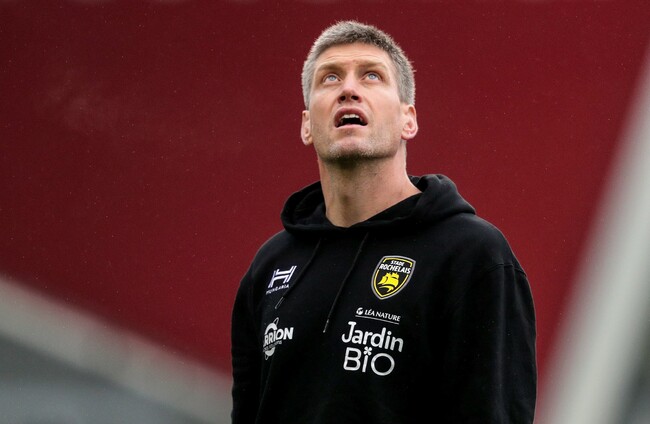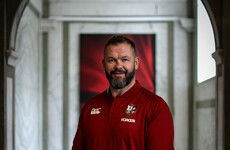DURING THE WEEK, Ronan O’Gara took to Twitter to share a quote from Swiss psychiatrist and psychoanalyst Carl Jung that had resonated with him personally and professionally.
“An understanding heart is everything in a teacher, and cannot be esteemed highly enough. One looks back with appreciation to the brilliant teachers, but with gratitude to those who touched our human feeling. The curriculum is so much necessary raw material, but warmth is the vital element for the growing plant and for the soul of the child.”
This is relevant to what former Munster and Ireland man O’Gara is trying to do as head coach of La Rochelle in France.
Now into his second season with the Top 14 club, O’Gara understands more than ever that connecting with his players and staff on a human level is as vital as all of the attacking plays, defensive systems, and kicking strategies that he has implemented.
Working alongside director of rugby Jono Gibbes, O’Gara helped to guide La Rochelle to a fifth-place finish in the highly-competitive French league in the curtailed 2019/20 season, while they have started the new campaign impressively with four wins in five games leaving them third in the table coming into this weekend.
The content of O’Gara and Gibbes’ coaching is crucial, of course, but the Irishman believes a focus on the club’s culture is just as important.
“The bottom line is that it comes down to attitude and how you get attitude from players is your capacity to connect with them,” says O’Gara, who will be part of Virgin Media’s coverage of Super Saturday in the Six Nations today.
His former team-mate, Paul O’Connell, believes that O’Gara’s ability to connect with people is a key strength of his ever-growing coaching skillset and it’s one of the main reasons that O’Connell would love to see him coaching Munster in the future.
Ex-Ireland out-half O’Gara explains that this isn’t exactly his natural way but that he began to appreciate the importance of this part of the job when he joined the Crusaders as an assistant coach in 2018, spending two years working under Scott ‘Razor’ Robertson in New Zealand as they won two Super Rugby titles in his time there.
O’Gara saw that Robertson’s hard work in getting to know his players and creating a positive environment ensured every single one of them felt comfortable enough to truly show the skills that had seen them become professional rugby players. Robertson has built a set-up where everyone involved inherently believes they can be successful.
“I was closed in Munster, just in terms of maybe I had a really loyal bunch of team-mates and my own friends from school so I didn’t feel I needed to really mix,” explains O’Gara, whose coaching career began with Racing 92 in France.
“I was very happy with my lot, but my eyes really got opened going to Crusaders, that’s where it all changed.
“It’s not the American bullshit of over-positivity, it’s actually getting a lot of people of a similar mindset that actually believe it can happen. It can only happen if you work, if you have detail in your work, and you want it to happen.
“Razor would be a prime example of it. Before I went there, if a senior player at my club got injured, I might think, ‘Ah no, that’s not good for the weekend.’
“He would be the opposite, he would say, ‘Wow, I cannot wait to see this young fella play’ and it’s not an act. He is convinced that anyone is ready to go in his environment.”
And so, O’Gara has brought that mindset into La Rochelle, where some players have had to get used to being treated differently.
“You have guys with 10 years of Top 14 experience who haven’t really ever been loved or appreciated and all of a sudden we’re trying to say, ‘Listen, we’re a team that actually cares for each other, boys,’” says O’Gara.
“They’re looking at me as if I have 10 heads.
“It’s about connecting and getting the best out of people. For that to happen, they have to know you first. We’re honestly at such a beginner’s stage – that’s not an excuse – but you have the French language and interpretations as well, but we’re learning.”
O’Gara and Gibbes have also brought in the ‘themeing’ concept that the Crusaders have so successfully used to ensure they’re constantly connected as a group, working towards their goals in a collective fashion.
Understandably, O’Gara wants to keep La Rochelle’s theme for this season in-house but he’s happy to report that the players have taken to it and enjoyed the various visiting speakers and presentations involved.
“It can’t all just be rugby, rugby, rugby,” underlines O’Gara but he points out that a positive off-field environment affects how players engage with each other.
“With Crusaders, I was the backs coach in charge of around 16 or 17 backs, and in the unit meetings, you would get into real detail.
“The discussions were fascinating and you would have guys who may only play four Super Rugby games a year but their capacity to contribute was brilliant. They actually helped their mate.
“They’d be saying, ‘If you get to his inside shoulder and if you actually run this line, that could create all kinds of possibilities for someone else.’”
That selflessness is something La Rochelle have been working to build and O’Gara says he feels all of this work on the cultural side of things is slowly starting to help out on the pitch.
With their defence having conceded the fewest points in the Top 14 so far this season, La Rochelle’s attack has looked sharp in recent weeks during wins over Toulon, Bayonne, Castres, and Bordeaux. These are still early days but the signs are good.
“It’s the first time I’ve seen transfer, it’s encouraging,” says O’Gara, who coaches both the attack and defence at La Rochelle.
“I keep coming back to believing in empowering the players, but it’s empowering them with a framework that they can hopefully use to exploit their talents.
“For example, I’m hoping that the work we’ve done on the training pitch means that a guy has option A, option B, and option C and it’s up to him to decide which option to pull the trigger on.”
French players love offloading the ball and while O’Gara doesn’t want to stifle their skill and creativity, there has been refinement in this area too.
“You can’t take that out of their game but it’s just trying to get smart around when to use an offload and make some… not rules, but just talking about what conditions look like for a good offload and how you can win the space before you offload.”
O’Gara’s thoughtful rugby brain enjoys these challenges, even if there are testing moments when passions run high.
At the age of 43, with seven years of professional coaching behind him, O’Gara stresses that he doesn’t know it all.
“That’s the beauty of it, I’m learning every day. That’s not a cop-out. The game is ever-evolving and it’s changing very quickly.
“The reality is that I don’t know where it will go with La Rochelle but I’m very excited.
“You want silverware but you can’t let that eat at you. My mindset has always been that I can prepare well. If you prepare well, I don’t think you can have many regrets.”
Watch the final round of the Guinness Six Nations live on Virgin Media One this Saturday from 1.30pm.
Pragmatists Bernard Jackman and Murray Kinsella join the deludedly optimistic Gavan Casey to look ahead to the big one in Paris:
The42 Rugby Weekly / SoundCloud














Who cares
@George Thompson: me and possibly the other 2,300 people who read the article. Why care to comment?